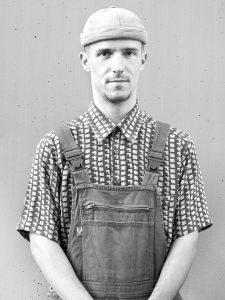Pablo Santacana López

Shortbio
- geb.1991 in Madrid
- seit 2021 Kollegiat am DFG-Graduiertenkolleg 2227 „Identität und Erbe“ an der Fachhochschule Erfurt und an der Bauhaus-Universität Weimar
- 2018-2022 Mitglieder des Projekts Intervention M 21: Am Humboldtstrom – Sammeln in 19 Jahrhundert von Staatlichen Museen zu Berlin – Stiftung Preußischer Kulturbesitz und Universität der Künste Berlin, Institut für Kunst im Kontext
- 2018-2021 Masterstudium an der Universität der Künste Berlin, Institut für Kunst im Kontext (Berlin, Germany), Thesis: “Reenacting Assemblies/ Assembling reenactments”
- 2009-2016 Architekturstudium Polytechnische Universität Madrid mit Aufenthalten in Sao Paulo.
- 2012 Mitbegründer von „Vendedores de Humo“, Kunst Kollektiv
- Seit 2009 Tätigkeit als freiberuflicher Künstler, Teilnahme an Ausstellungen, Realisierung von künstlerischen Projekten im öffentlichen Raum, Tätigkeit als Kurator
Contact
Fachhochschule Erfurt- University of Applied Sciences
Fakultät Architektur und Stadtplanung
DFG-Graduiertenkolleg 2227 „Identität und Erbe”
Sitz: Schlüterstraße 1, D-99089 Erfurt
Para-enactments: softcore historicism and immersive display as spatial practice
Reenactments have become a recurrent vehicle for representing and validating historical narratives through collective stagings in public space. Reenactments are public activities in which participants recreate parts of a historical event or period for recreational and/or education purposes. Applying the term reenactment to an expanded format of experiential historical representation, this dissertation proposes the term ‘para-enactment’. Going besides, beyond, and in the interstices of canonical historical representations, para-enactments frame collective forms of historical representation that make use of historical immersion within practices of new museology and community living culture, insisting upon their relevance within the conservation of intangible heritage. Historical immersive displays are the technique from which reenactments are built. It defines the perception of feeling physically present in a specific historical (spatial and temporal) moment via spatial reconstruction and social interactivity.
This dissertation seeks to engage with historicist forms of knowledge production coming from art (performative and relational art), popular culture (historical fairs, reenactments, theme parks) and bottom-up initiatives (community museums) through the affective and the performative, bringing together concrete examples of immersive historical reconstructions from European and Latin-American contexts. This historicism is defined as ‘softcore’, opposing the term to a ‘hardcore’ historicism in pursuit of a reclaimed authenticity –working within the Real–towards the identification of such practices as artistic processes, working within symbolisim and imagination. Thus, the dissertation poses the question of how traditions and rituals are built into contemporaneity in relation to cultures of remembrance, and investigates their imaginary and symbolic agency within society. The objective of the research is to define the cases in which processes of commodification of the collective memory make dissident agency impotent, and to determine the conditions where a dissident politically-engaged para-enactment can? emerge.
Publications
- Santacana López, Pablo: Marta M. Legido: “Esfera piedra, Polígono”, Instituto de la Juventud, 2021
- Santacana López, Pablo, Zoe Ritts: “Der Sound des Mythos, Berliner Clubs zwischen Alternativkultur und Gentrifizierung”, in Arch+ Issue 241 “Berlin Theorie”, 2020. URL: https://archplus.net/de/ausgabe/241/#article-5901
- Santacana López, Pablo: “Privilege carved on stone, On the reconstruction of colonial legacy and the safeguarding of living cultures in the Humboldt Forum, Berlin“ in: Arts Of The Working Class, Issue n°13 “Eurothanasia”, 2020. URL: http://artsoftheworkingclass.org/text/privilege-carved-in-stone
- Santacana López, Pablo: “Redrawing the MAP of 90´s Berlin”, in: Contemporary And (C&), Issue n°10 “Another 89”.
- Santacana López, Pablo: “The Castle, The Palace, The Mirage, On Esper Postma’s “Mirror Stage” At Gropius Bau, Berlin” in Texte Zur Kunst, URL https://www.textezurkunst.de/articles/pablo-santacana-lopez-castle-palace-mirage/
- Santacana López, Pablo: “Spatial Struggle and Queer Resistance”, in Kaltblut Magazine, 2021. URL https://www.kaltblut-magazine.com/spatial-struggle-and-queer-resistance-by-pablo-santacana-lopez/
- Santacana López, Pablo: “Time Loops: Reenactment, reconstruction and historical mimicry”, in: Eigenart Magazine, Universität der Künste Berlin, 2020. URL https://eigenart-magazin.de/time-loops-reenactment-reconstruction-and-historical-mimicry/